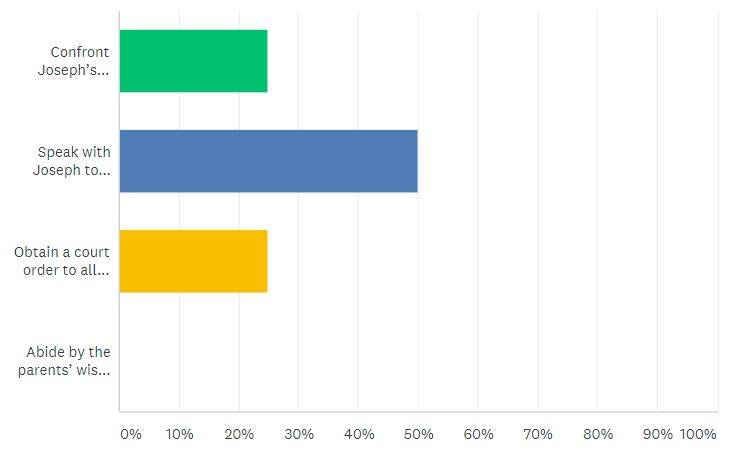July Question
In July, we read about a case in which a young boy disagreed with his parents about treatment. Let’s take another look:
Joseph, an exceptionally bright and articulate 13 year old, is found to have a rapidly growing osteosarcoma in his right femur. Surgery is required and it is likely that a blood transfusion will be required during the operation. As Jehovah’s Witness practitioners, Joseph’s parents state that they are unwilling to give their consent to any procedure which involves giving him blood products. Initially, Joseph agrees with them, even though you thoroughly explain the risks of refusing treatment. However, later on, when you and your colleagues are alone with Joseph, he tells you that he is scared and would like you to do whatever you think is best. What do you do next?
A. Confront Joseph’s parents and reveal his fear of dying. Explain to them again that the blood transfusion could save his life and that surgery is the only viable option to save his leg.
B. Speak with Joseph to confirm his wishes and bring the case to the hospital medical ethics committee. Allow them to decide what would be best for Joseph so that you don’t have to confront the parents and damage your relationship with them.
C. Obtain a court order to allow Joseph to receive blood products and schedule the surgery. Joseph has expressed his desire to receive lifesaving blood products and you should abide by his wishes.
D. Abide by the parents’ wishes and do not prepare blood products. Joseph does not have medical or legal authority to decide his own care. Proceed with the surgery, since the parents and Joseph have been fully informed of the risks of the surgery without blood products.

Responses were mixed for this question. Half of respondents thought that the medical ethics committee should make the decision, in order to preserve the physician-patient-guardian relationship. Twenty-five percent thought that the physician should bring Joseph’s desires to his parents for further discussion. Another quarter of respondents believed that C was the correct answer, and that Joseph’s wishes should be obeyed, regardless of the parents’ desires.
Note from the Editors-in-Chief: This month is Suicide Awareness Month. As such, this issue’s question is themed around physician suicide, an issue which already has or will likely affect all physicians. If you or a friend is struggling and considering self-harm or suicide, please contact your program director, Student Affairs, a mental health provider, or another trained professional. The National Suicide Prevention Lifeline is available 24 hours per day, seven days per week: 1-800-273-8255.
September Question
You are working an overnight shift with one of your colleagues when a code blue is announced overhead. After a long and arduous code, the decision is made to withdraw care. Afterwards, you and your fellow resident are sitting in the call room, both exhausted. Your colleague tells you that she had been working with this patient for weeks, and that the team thought the patient was finally turning the corner. She tells you that being in medicine might not be worth it. She also tells you she isn’t sure whether she wants to live, when she can’t even save her patients. You are very distressed by her response and you aren’t sure how to react. What do you do?
Tell us what you think!
Bridget Ralston is a member of The University of Arizona College of Medicine – Phoenix Class of 2020. She graduated from Santa Clara University in 2015 with a Bachelor of Science in Chemistry and a French minor. She de-stresses by whipping up delicious treats (and subsequently devouring them), playing soccer, and cuddling with her cat, Tuxedo. She has a particular interest in healthcare for underserved communities.


